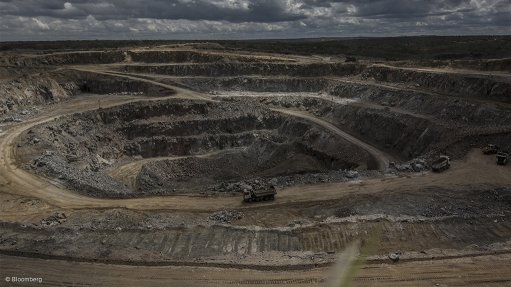
CONTRIBUTION OF NOTE
The Brazilian mining industry contributes about 4% to the national gross domestic product with the value of mineral production amounting to about $24-billion
Photo by: Bloomberg
With mining having played a significant role in the history and development of both South Africa and Brazil, it is “natural and appropriate” that the two countries exchange ideas about how to improve the mining sector in these countries, says Brazilian ambassador to South Africa Nedilson Jorge.
Speaking at a seminar hosted by the Embassy of Brazil, in Johannesburg, last month – during which perspectives relating to the two countries’ mining and legal frameworks were shared by industry stakeholders – he emphasised that the government of Brazil was committed to the continued proposal of measures to encourage the growth of its mining industry.
Further, the country intends to promote technical cooperation and technical agreements with other countries and their academic institutions, with South Africa considered a priority in this regard.
Jorge highlighted the recent economic changes in Brazil, noting that, after having faced a severe crisis and economic recession, government had put in place a series of measures and structural reforms.
“The value of those measures is already evident,” he enthused, noting that the economic recession had been reversed and that the economy had grown in the past two consecutive quarters.
Jorge suggested that Brazil was “clearly treading paths of low inflation and low interest rates and economic recovery”, with analysts observing that the country might be entering a new cycle of sustained growth, characterised by productivity and mainly as a result of fiscal responsibility and a resurgence of private investment.
He acknowledged that “economic rationale and predictability are underlying elements” of the reforms implemented in Brazil to improve the business environment and economic productivity.
The reforms included institutional and regulatory modernisation in the mining sector, which Jorge stressed was vital to the country.
Speaking in a video message played at the seminar, Brazil Minister of Mines and Energy Fernando Coelho Filho also underscored Brazil’s commitment to creating an improved environment for developing the mining sector.
He explained that the private sector and government were working together to refresh the Brazilian mining code and create new opportunities for companies to invest in the South American country.
Recent changes in the mining industry include the creation of a National Mining Agency.
The Brazilian mining industry contributes about 4% to the country’s gross domestic product (GDP), with the value of mineral production amounting to about $24-billion. The value of mineral exports total about $17.4- billion, which is about 9.4% of all exports.
Brazil has about 8 400 active mines, employing about 200 000 workers.
Meanwhile, South African Deputy Mineral Resources Minister Godfrey Oliphant highlighted the two governments’ common goal of creating conducive environments for the economies of the countries to grow.
“As members of Brics (Brazil, Russia, India, China and South Africa), we are a powerful bloc of emerging economies and we can leverage our individual strengths for the growth and development of our respective economies and for Brics as a whole,” he stressed, adding that South Africa looked forward to strengthening cooperation with Brazil, particularly in the area of mining.
Oliphant emphasised that South Africa remained a strong mining jurisdiction, with at least 1 600 mines and quarries operating in the country and employing more than 400 000 people.
“To us, mining does matter,” he noted, pointing out that South Africa produced more than 53 commodities, while its contribution to GDP was a significant 8%.
Further, with South Africa having mined for more than 150 years, the country had the skills and knowledge, as well as the expertise, to share its experiences, “because it has seen the good, the bad and the ugly side of mining”, Oliphant said.